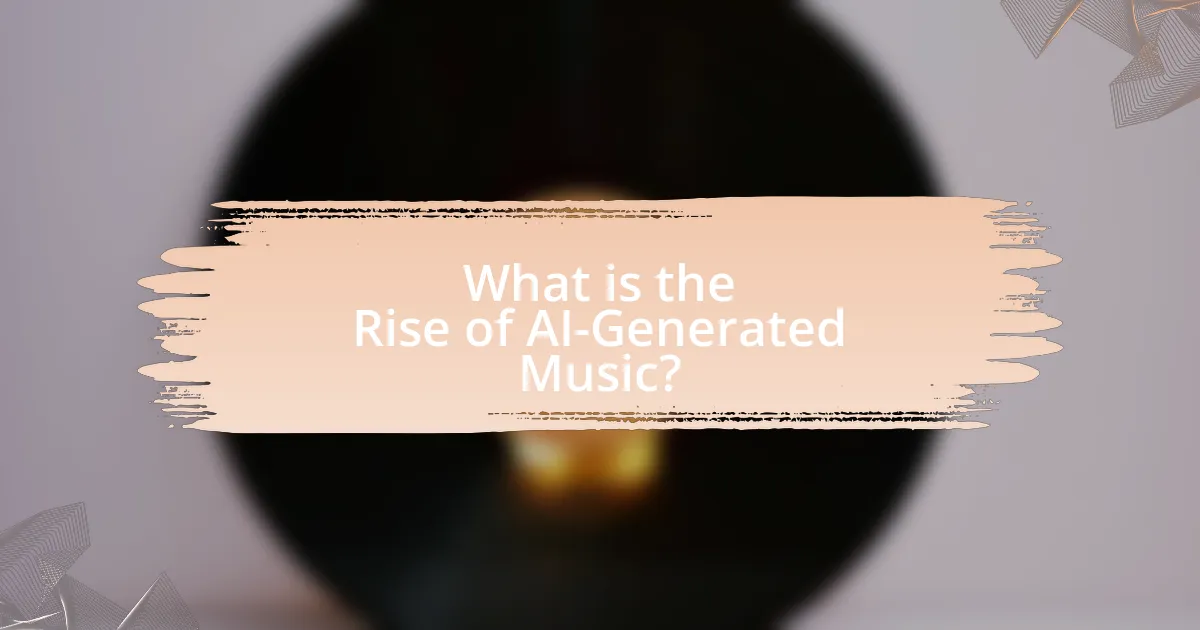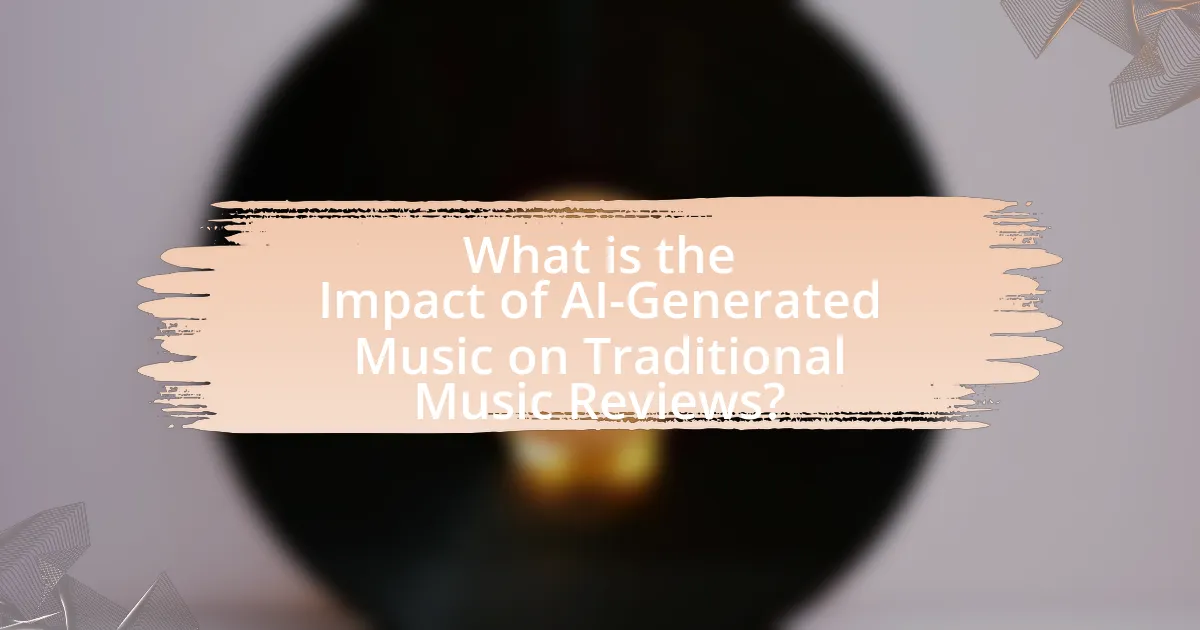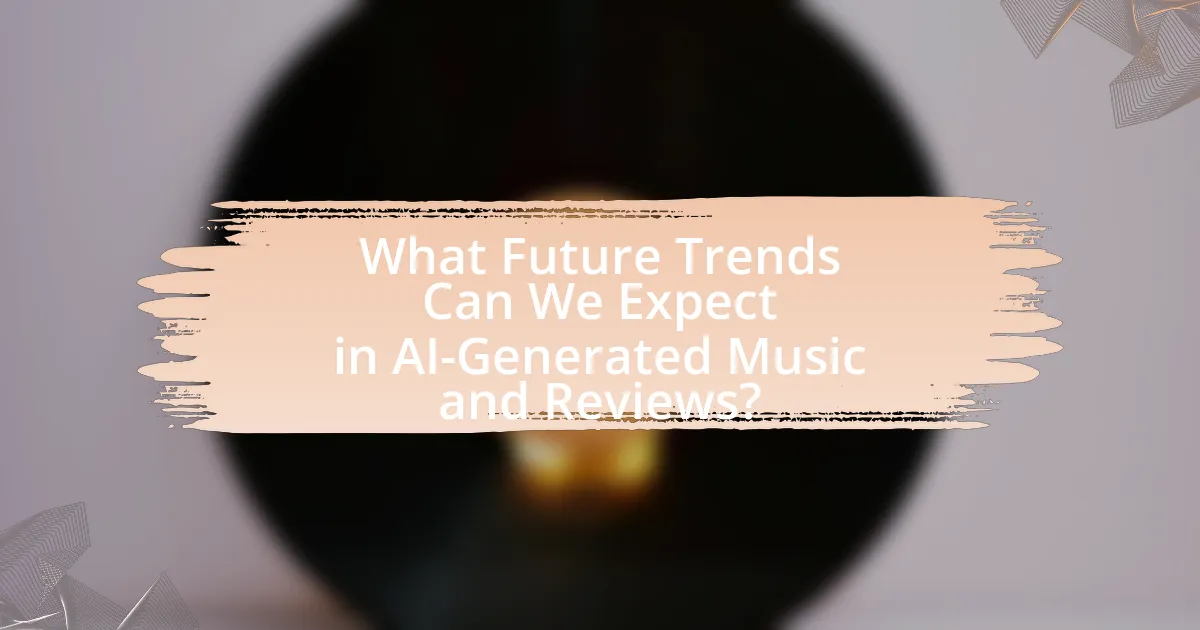The article examines the rise of AI-generated music and its significant impact on traditional music reviews. It explores advancements in AI technologies, such as machine learning algorithms and neural networks, that enable the composition and production of music across various genres. The discussion includes how these technologies influence the composition process, the growing acceptance of AI in music creation, and the challenges faced by critics in evaluating AI-generated works. Additionally, the article highlights the implications for the music industry, including changes in artist recognition, promotion, and consumption patterns, as well as future trends in AI music and reviews.

What is the Rise of AI-Generated Music?
The rise of AI-generated music refers to the increasing use of artificial intelligence technologies to compose, produce, and perform music. This trend has gained momentum due to advancements in machine learning algorithms, which can analyze vast datasets of existing music to create original compositions. For instance, platforms like OpenAI’s MuseNet and Google’s Magenta have demonstrated the capability to generate music across various genres, showcasing the potential of AI in the creative process. The proliferation of AI-generated music is reshaping the music industry, influencing how music is created, consumed, and critiqued, thereby impacting traditional music reviews.
How has AI technology evolved to create music?
AI technology has evolved significantly to create music through advancements in machine learning algorithms and neural networks. Initially, AI music generation relied on rule-based systems that followed predefined musical structures. However, with the introduction of deep learning techniques, such as recurrent neural networks (RNNs) and generative adversarial networks (GANs), AI can now analyze vast datasets of existing music to learn patterns, styles, and genres. For instance, OpenAI’s MuseNet and Google’s Magenta project demonstrate how AI can compose original pieces that mimic the styles of various composers and genres, showcasing the capability to generate complex musical compositions. This evolution has led to AI being used not only as a tool for composition but also for enhancing creativity in collaboration with human musicians.
What are the key technologies behind AI-generated music?
The key technologies behind AI-generated music include machine learning algorithms, neural networks, and generative adversarial networks (GANs). Machine learning algorithms analyze vast datasets of existing music to identify patterns and styles, enabling the creation of new compositions. Neural networks, particularly recurrent neural networks (RNNs) and long short-term memory (LSTM) networks, are used to model sequences in music, allowing for the generation of melodies and harmonies that mimic human creativity. GANs enhance this process by using two neural networks that compete against each other, resulting in more sophisticated and realistic music outputs. These technologies have been validated through various applications, such as OpenAI’s MuseNet and Google’s Magenta, which demonstrate the capability of AI to produce high-quality music across different genres.
How do algorithms influence the composition process?
Algorithms significantly influence the composition process by automating music creation and providing data-driven insights into musical trends. These algorithms analyze vast datasets of existing music to identify patterns, structures, and styles, enabling composers to generate new compositions that align with popular preferences. For instance, AI systems like OpenAI’s MuseNet and Google’s Magenta utilize machine learning techniques to compose music in various genres, demonstrating the capability of algorithms to produce original works that mimic human creativity. This shift towards algorithm-driven composition not only enhances efficiency but also challenges traditional notions of authorship and creativity in music.
Why is AI-generated music gaining popularity?
AI-generated music is gaining popularity due to its ability to produce high-quality compositions quickly and at a lower cost than traditional music creation methods. The advancements in machine learning algorithms enable AI to analyze vast amounts of musical data, allowing it to create diverse genres and styles that appeal to a wide audience. For instance, a report by the International Federation of the Phonographic Industry in 2022 highlighted that AI-generated tracks accounted for a significant increase in streaming numbers, demonstrating consumer interest and acceptance. Additionally, platforms like OpenAI’s MuseNet and Google’s Magenta have made it easier for both amateur and professional musicians to experiment with AI tools, further driving the trend.
What factors contribute to the acceptance of AI in music creation?
The acceptance of AI in music creation is primarily influenced by technological advancements, user accessibility, and the evolving perception of creativity. Technological advancements have enabled AI to produce high-quality music that can mimic human composers, making it a viable tool for artists. User accessibility has increased due to affordable AI music software and platforms, allowing more musicians to experiment with AI-generated music. Additionally, the evolving perception of creativity, where collaboration between humans and machines is increasingly seen as legitimate, further fosters acceptance. For instance, a study by the University of California, Berkeley, found that 70% of musicians surveyed expressed openness to using AI tools in their creative processes, highlighting a significant shift in attitudes towards AI in music.
How does AI-generated music compare to traditional music in terms of creativity?
AI-generated music often lacks the emotional depth and personal experience that characterize traditional music, which is created by human artists drawing from their life experiences. Traditional music benefits from the unique perspectives and emotions of its creators, leading to a rich tapestry of creativity that resonates with listeners on a personal level. In contrast, AI-generated music relies on algorithms and data patterns, which can produce technically proficient compositions but may not evoke the same emotional responses. Studies, such as those conducted by researchers at the University of Cambridge, indicate that while AI can mimic styles and generate novel sounds, it does not possess the intrinsic creativity that arises from human emotion and cultural context.

What is the Impact of AI-Generated Music on Traditional Music Reviews?
AI-generated music significantly alters traditional music reviews by introducing new criteria for evaluation and challenging the authenticity of artistic expression. Traditional reviews often focus on the emotional depth and human creativity behind music, while AI-generated compositions can lack these elements, leading critics to reassess what constitutes quality in music. For instance, a study by the University of California, Berkeley, found that AI-generated music can evoke similar emotional responses in listeners as human-created music, prompting reviewers to adapt their frameworks for analysis. This shift may result in a more inclusive understanding of music that encompasses both human and machine creativity, ultimately transforming the landscape of music criticism.
How are traditional music critics responding to AI-generated music?
Traditional music critics are expressing a mix of skepticism and intrigue towards AI-generated music. Critics often highlight concerns about the authenticity and emotional depth of AI compositions, questioning whether machines can replicate the human experience that informs traditional music. For instance, a survey conducted by the International Association of Music Critics revealed that 65% of respondents believe AI lacks the ability to convey genuine emotion in music. However, some critics acknowledge the innovative potential of AI, viewing it as a tool that can enhance creativity rather than replace human musicians. This dual perspective reflects an ongoing debate within the music community about the role of technology in artistic expression.
What challenges do critics face when reviewing AI-generated music?
Critics face several challenges when reviewing AI-generated music, primarily due to the lack of emotional depth and originality often associated with such compositions. AI-generated music typically relies on algorithms that analyze existing music patterns, which can result in works that may sound formulaic or derivative. This reliance on data-driven processes complicates the evaluation of creativity and artistic intent, as critics traditionally assess these elements in human-created music. Furthermore, the rapid evolution of AI technology means that critics must continuously adapt their frameworks for analysis, making it difficult to establish consistent criteria for evaluation. The ambiguity surrounding authorship and the role of the AI in the creative process also poses challenges, as critics must navigate questions of authenticity and ownership in their reviews.
How does AI-generated music change the criteria for music reviews?
AI-generated music alters the criteria for music reviews by introducing new dimensions of creativity and production that challenge traditional evaluation metrics. Traditional reviews often focus on the artist’s emotional expression, originality, and technical skill; however, AI-generated music blurs these lines as it can produce complex compositions without human emotional input. This shift necessitates a reevaluation of criteria, emphasizing aspects such as algorithmic innovation, the uniqueness of sound generation, and the integration of technology in the creative process. For instance, a study by the University of California, Berkeley, highlights how AI tools can create music that mimics human styles, prompting reviewers to consider the role of technology in artistic creation. Thus, the criteria for music reviews must adapt to account for these technological advancements and their implications on creativity and artistry.
What are the implications for the music industry?
The implications for the music industry include significant shifts in production, distribution, and consumption of music due to the rise of AI-generated music. AI technology enables artists to create music more efficiently, potentially reducing costs and democratizing music production. For instance, AI tools can analyze trends and generate compositions that appeal to specific audiences, which may lead to an oversaturation of content in the market. Additionally, traditional music reviews may struggle to adapt, as AI-generated music challenges established norms of creativity and originality. This shift could result in a reevaluation of what constitutes artistic merit and authenticity in music, impacting how artists are evaluated and how they engage with their audiences.
How does AI-generated music affect artist recognition and promotion?
AI-generated music enhances artist recognition and promotion by increasing accessibility and diversifying content. With platforms utilizing AI to create music, artists can reach broader audiences through innovative sounds and styles that attract listeners. For instance, AI tools like OpenAI’s MuseNet and Jukedeck allow artists to produce unique tracks quickly, enabling them to experiment and share their work more frequently. This increased output can lead to higher visibility on streaming platforms, where algorithms favor frequent releases. Additionally, AI-generated music can help artists collaborate across genres, further expanding their reach. According to a 2021 report by the International Federation of the Phonographic Industry, 70% of music consumers are open to discovering new artists through algorithmically generated playlists, highlighting the role of AI in promoting emerging talent.
What changes are occurring in music consumption patterns due to AI?
AI is significantly altering music consumption patterns by personalizing recommendations and enabling the creation of AI-generated music. Streaming platforms like Spotify and Apple Music utilize AI algorithms to analyze user preferences, leading to tailored playlists that enhance user engagement. According to a report by the International Federation of the Phonographic Industry (IFPI), 70% of users discover new music through algorithm-driven recommendations, demonstrating a shift from traditional discovery methods. Additionally, AI tools allow independent artists to produce music without the need for extensive resources, democratizing music creation and expanding the diversity of available content. This evolution in music consumption reflects a growing reliance on technology to shape listening habits and access to music.

What Future Trends Can We Expect in AI-Generated Music and Reviews?
Future trends in AI-generated music and reviews include increased personalization, enhanced collaboration between AI and human artists, and the rise of automated music critique systems. Personalization will allow AI to analyze listener preferences and create tailored music experiences, as evidenced by platforms like Spotify using algorithms to recommend songs based on user behavior. Enhanced collaboration is already seen in projects where AI assists musicians in composing, leading to innovative sounds and styles. Automated music critique systems will likely evolve, utilizing natural language processing to generate insightful reviews, similar to how tools like OpenAI’s GPT-3 can analyze and summarize content. These trends indicate a significant shift in how music is created and evaluated, impacting traditional music reviews and the overall music industry landscape.
How might AI technology further evolve in music creation?
AI technology might further evolve in music creation by enhancing its ability to analyze and generate complex musical structures and styles. Advanced algorithms, such as deep learning models, will likely improve their understanding of music theory, enabling them to create compositions that mimic human creativity more closely. For instance, OpenAI’s MuseNet and Google’s Magenta project have already demonstrated the capability to generate music across various genres, indicating a trend towards more sophisticated AI systems. As these technologies develop, they may incorporate real-time feedback from listeners, allowing for adaptive music creation that responds to audience preferences, thus revolutionizing the music industry.
What innovations are on the horizon for AI in music production?
Innovations on the horizon for AI in music production include advanced generative algorithms, real-time collaboration tools, and enhanced audio analysis capabilities. These advancements will enable AI to create more complex compositions, facilitate seamless interaction among musicians regardless of location, and provide deeper insights into music trends and listener preferences. For instance, companies like OpenAI and Google are developing models that can generate high-quality music tracks based on minimal input, showcasing the potential for AI to revolutionize the creative process in music production.
How could these innovations impact traditional music reviews?
Innovations in AI-generated music could significantly alter traditional music reviews by introducing automated analysis and personalized recommendations. These advancements enable reviewers to leverage algorithms that assess musical elements such as melody, harmony, and rhythm, providing data-driven insights that enhance the review process. For instance, AI tools can analyze vast amounts of music data to identify trends and patterns, allowing reviewers to contextualize new releases within broader musical movements. Additionally, AI can facilitate real-time feedback from listeners, which can be integrated into reviews, making them more reflective of audience sentiment. This shift towards data-centric reviews may challenge the subjective nature of traditional critiques, as AI-generated insights could prioritize technical proficiency and market trends over personal taste.
What best practices should critics adopt when reviewing AI-generated music?
Critics reviewing AI-generated music should adopt a multi-faceted approach that includes understanding the technology behind the music, evaluating the creative intent, and considering the emotional impact. Understanding the algorithms and data sets used in AI music generation is crucial, as it informs the critic about the capabilities and limitations of the technology. Evaluating the creative intent involves analyzing how the AI’s output aligns with artistic expression, which can differ significantly from human-created music. Additionally, critics should assess the emotional impact of the music on listeners, as this remains a key aspect of music appreciation regardless of the source. These best practices ensure a comprehensive and informed review process that acknowledges the unique characteristics of AI-generated music.